
How to Show Wi-Fi Password on Asus ROG Phone 7

How to Show Wi-Fi Password on Asus ROG Phone 7
Since the invention of Android OS in 2008 by Andy Rubin, our world has faced a dramatic change. Android seems to be controlling a considerably high portion of our life. We have bought many gadgets that use this amazing OS and most of which are phones. But how much can you do with your Android phone? Developers are always making it more interesting to use this interface.
Most of the time, we use Android phones, we get faced with the need to access the internet. The Wi-Fi capability of these Android gadgets makes it super easy for us to surf the web. Throughout using Wi-Fi, we connect to a number of them. This could be at school, a sub-way café, the gym, buses, hospitals, hotels, towns, and the list is endless. A password secures most of this. Needless to say, our brain is weak to store all these passwords for future use, especially if you would want to connect with a different gadget you have recently bought or even your laptop. In this article, we will introduce you to how to find wifi password on rooted and also unrooted Android devices.
Part 1: Show Wifi Password on Rooted Android Device
What is Rooting?
First of all, what does rooting mean? You have probably used a Windows computer or even Linux. For the case of Windows, when installing a new program or software, it always prompts a dialog box saying, “Administrator permission required to run this program.” If you don’t have the administrator permission, you won’t install the program. In Android, this is called rooting. In simple terms, it means having the root permission to your phone. Some Android apps will require you the root permission, e.g., flashing your ROM. In this part, we will explain how you can show the Wi-Fi password on your Android with root.
To find the Wi-Fi passwords on your Android phone, you need to have an app to explore files which also supports a root user. In this case, ES FileExplorer or Root Explorer will come in handy. However, it turns out that the latter is offered at $3. Let’s use the free ES File Explorer.

Steps of getting Wi-Fi password on Android with root
In only four steps, we, at this moment, learn how we can find the password of a Wi-Fi on an Android phone.
Step 1: Install the ES File Explorer
Download the ES File Explorer from your play store, install it, and open it.

Step 2: Enable Root Explorer
The root explorer needs to be enabled so that you can reach the root folders of the Wi-Fi passwords you need. By default, the root feature in this ES explorer is not enabled. To enable it, just tap on the list menu on the top left corner.:
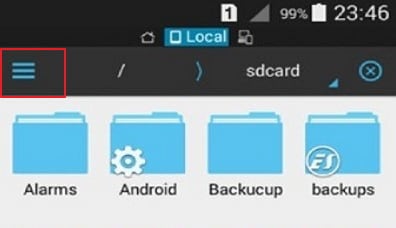
This will drop down a list of controls. Scroll down and find the Root Explorer option and enable it.
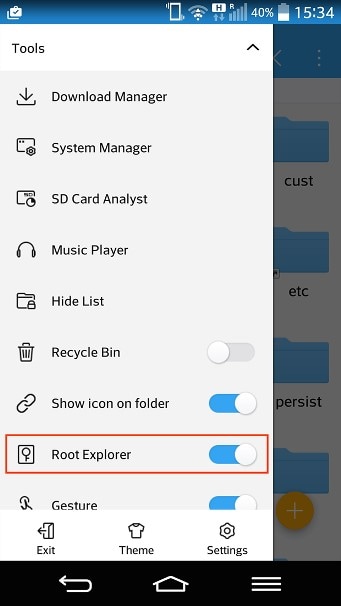
Step 3: Get the passwords’ file.
Go back to ES file explorer, and this time, find the folder named data.
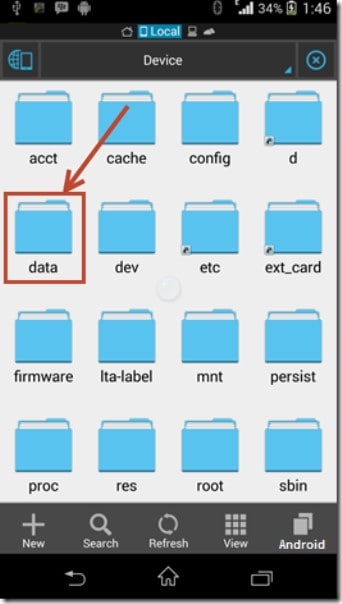
When this folder opens, find another one named misc. Open it and find another one named wifi. Here, find a file named wpa_supplicant.conf.

Step 4: Retrieve the wifi password on Android
Make sure that you don’t edit anything in the file. You might mess up with important data and fail to access the Wi-Fi(s) in the future.
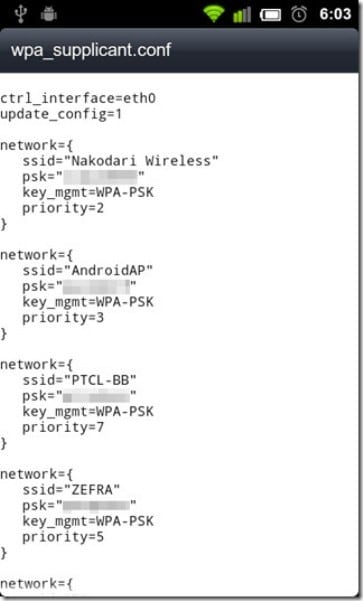
As you can see above, we have found the Wi-Fi passwords on the android device. On each network profile, we have the name of the network represented by name (ssid=”{the name}”), the network’s password represented by psk, the network’s access point represented by key_mgmt=WPA-PSK and its priority represented by priority.
Part 2: Show Wifi Password on Android without Root
What if I don’t have root access to my Android, can I still see Android Wi-Fi password? The short answer is yes. However, this is a bit involving but simple. You don’t need to be a computer guru to do it, but you need to have a computer and some internet access of course. The key thing is to find a way through which we can fetch the password file from the phone without using a root access protocol in the Android. This is made possible by some little programming insight using the Windows Command prompt.
Steps to show Wi-Fi password on Android without root
Step 1: Access the Developer authority
To access the files that Android uses to run passwords, you must first become a developer. This is very simple.
Get your Android phone and go to settings. Scroll down and find “About phone.” Tap on it and scroll down again to find Build number.

Tap on this “build number” 5 to 6 times until a message pops up, saying, “You are now a developer”.
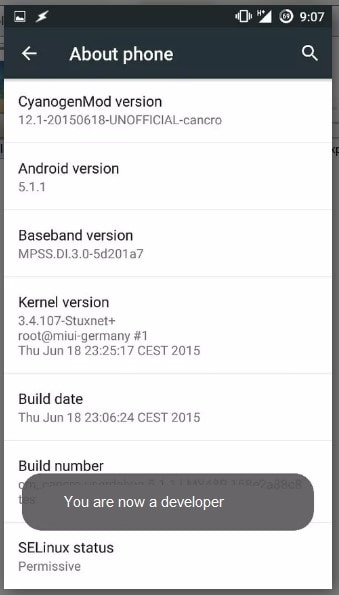
Step 2: Enable the debugging.
Go back to Settings. Scroll down for developer options. Turn on the button for “Android/USB debugging”.
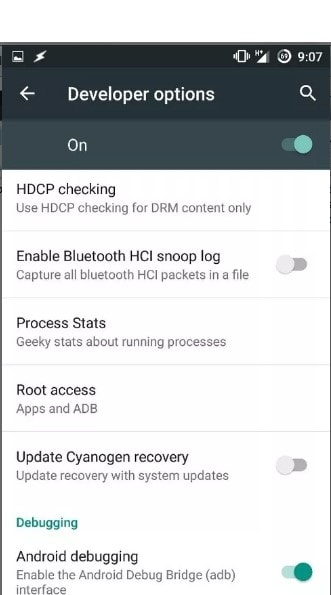
Step 3: Install ADB drivers.
Now, open your Windows desktop. Download and install ADB drivers. (Use this download link adbdriver.com ). You need to download and install platform tools (minimal ADB and fastboot) from http://forum.xda-developers.com/... Now open the folder where you’ve installed the above tools. By default, it is in the Local disc C\windows\system32\platform_tools location. However, you might want to locate them by searching on the windows search engine. You have to hold the Shift key and right-click inside the folder to click on”Open Command Window Here.”
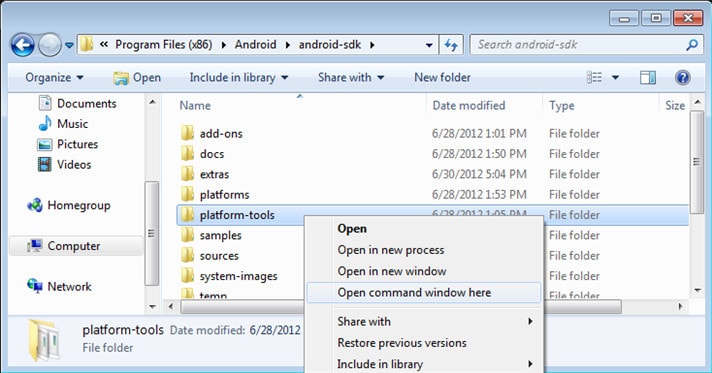
Step 4: Test the ADB
Here, we would like to test whether the ABD is working properly. To do this, connect your phone to the PC using a USB. In the command prompt, type adb services and then press enter. If it’s working properly, you should see a device on this list.

Step 5: Find the Android wifi password.
Now, it is time to type the given command in the command prompt and type: adb pull /data/misc/wifi/wpa_supplicant.conf c:/wpa_supplicant.conf. This will fetch the file from your phone to the local disc C drive of the PC.
Step 6: Get the wifi passwords.
Lastly, open the file with a notepad, and there you go.
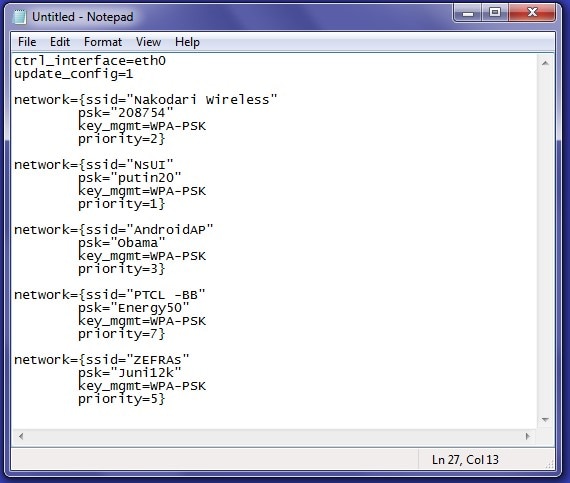
Now you learned how to show the wifi password on your Android device.
How Can We Unlock Our Asus ROG Phone 7 Phone Screen?
A phone lock acts as your Android phone’s shield against unauthorized users. Some users have new security features, such as fingerprint impression unlocks for an Android lock screen.
However, certain people like to create a PIN and password on their Google account as their Android screen lock. It tends to be distressing and tedious when you fail to remember the code of your Android phone. Surprisingly, being fully locked out of your device is awful. Also, it can be hard at first to unlock your Android.
Anyway, no one can escape such a situation. Yet, sit back and relax! We know several techniques on the best way to unlock your phone and set a screen lock. You can attempt software like Wondershare Dr.Fone - Screen Unlock for Android to assist you with unlocking your phone in a couple of steps. Besides this, there are various other ways.
Part 1: What Is Your Asus ROG Phone 7 Phone Lock System?
There are three types of standard lock types available for Android. You can set a PIN/password, fingerprint, or a pattern as your phone lock. All have their pros and cons. However, everyone should select the ideal one based on their liking and ease of use.
Once you decide on the phone lock type, you can enable or disable them from the Security tab in your Android phone’s settings. After you set a screen lock, your Android will require it every time you try to open your device.
Here you will see how to set up a screen lock on your Android device:
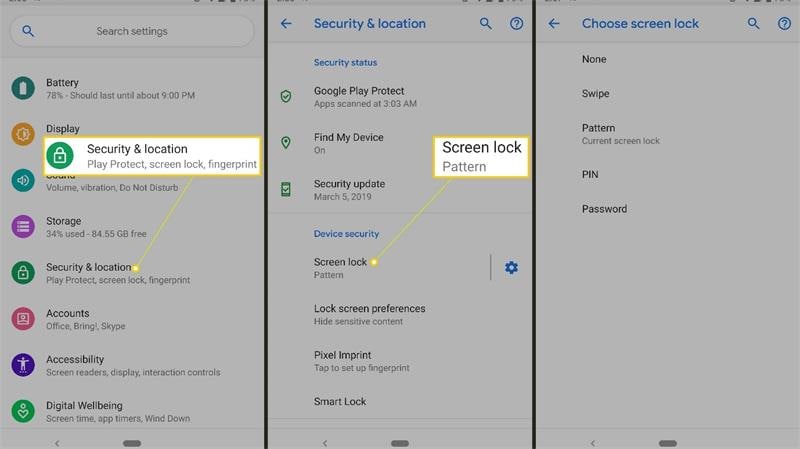
Part 2: Quickly Unlock Your Screen By Dr.Fone
Dr.Fone - Screen Unlock
For a quick, easy, and hassle-free unlocking experience, we suggest you download Dr.Fone - Screen Unlock. Dr.Fone not only unlocks your phone but keeps your data secured during the process. It has a simple interface, and even an amateur can use it to unlock their device.
So, look no further if you want to remove your Android screen lock in just a few clicks. Install Dr.Fone and enjoy using your device again.

Dr.Fone - Screen Unlock (Android)
The Best Tool to unlock Android Phone Screen!
- Remove all Android screen locks (PIN/pattern/fingerprints/face ID) in minutes.
- Bypass the FRP lock of Samsung without a PIN or Google account.
- Everyone can handle the lock screen without any tech knowledge.
- Provide specific removal solutions to promise success rate.
4,008,672 people have downloaded it
Step 1. Open Dr.Fone on your PC and select the “Screen Unlock” tool.

Step 2. Select Unlock Android Screen
This is the page to start your unlock process with two options here, please select” Unlock Android Screen” to unlock your device screen.
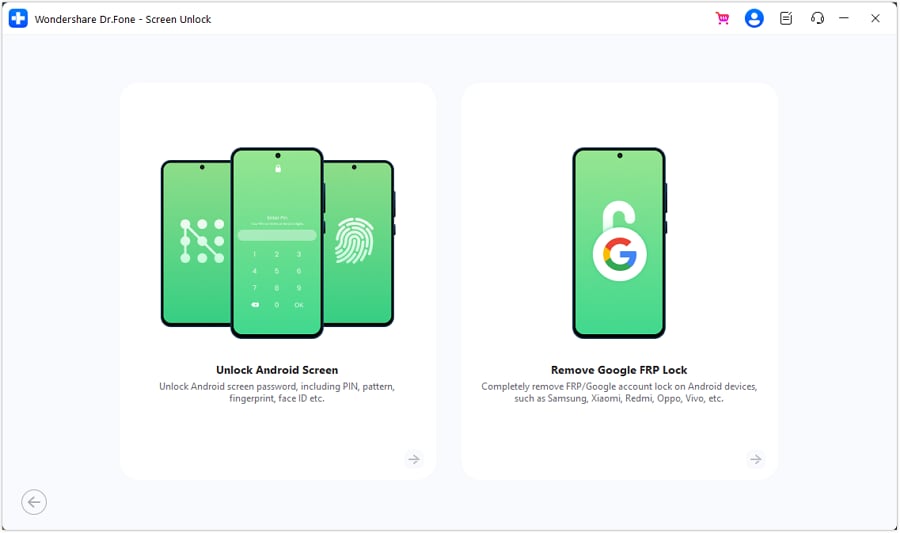
Step 3. Select device model
For most Brands, it should be “100% Remove Screen Lock”. These two solutions unlock screens for almost all Android devices, for example, Samsung, Huawei, OPPO, Vivo, Lenovo, LG, etc.
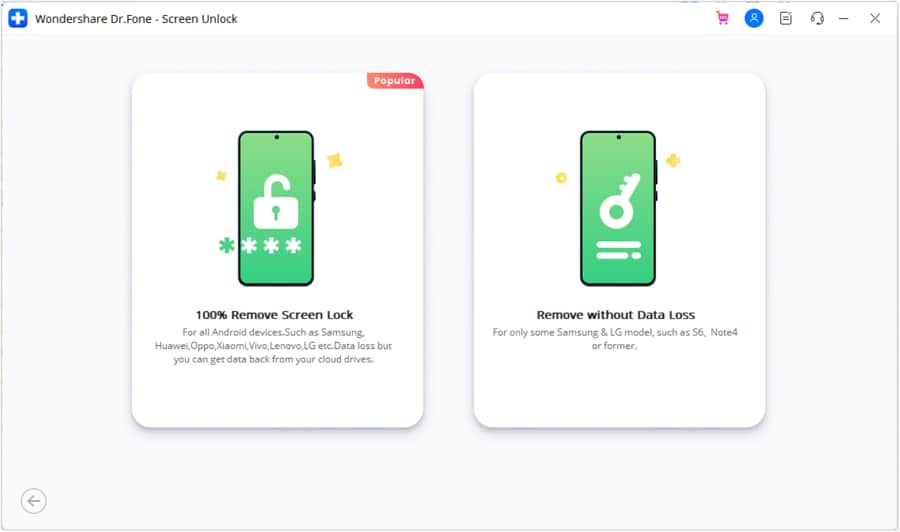
In the supported device brands list, please find the right one for you.
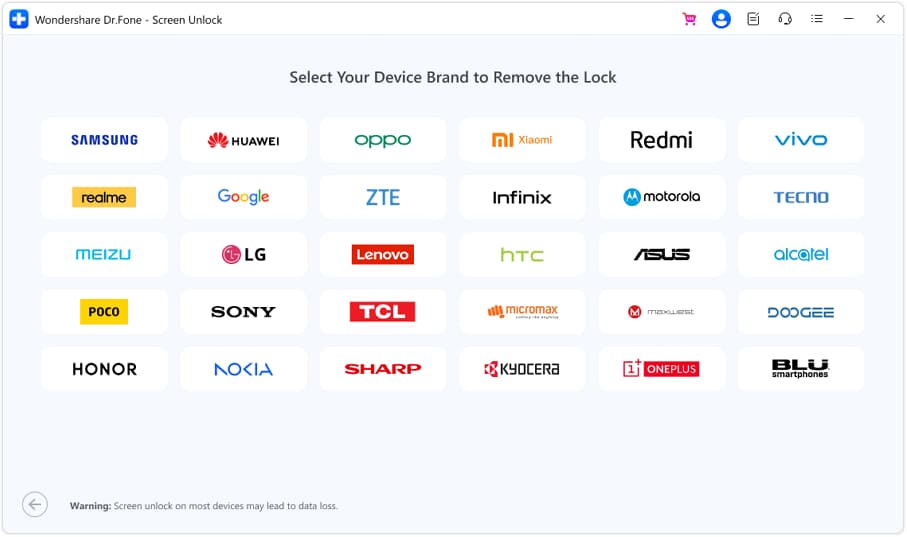
Step 4. Enter into Recovery Mode
Before unlocking your device screen, the instructions below are here to help you to get into Recovery Mode. We take 3 Samsung phones as an example.
Get into Recovery Mode on Samsung phone with Bixby:
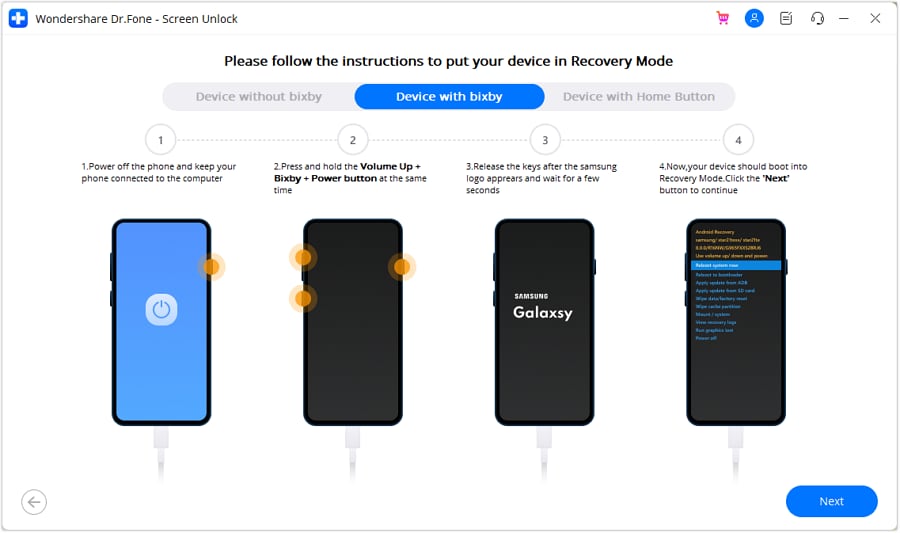
Get into Recovery Mode on Samsung phone without Bixby:
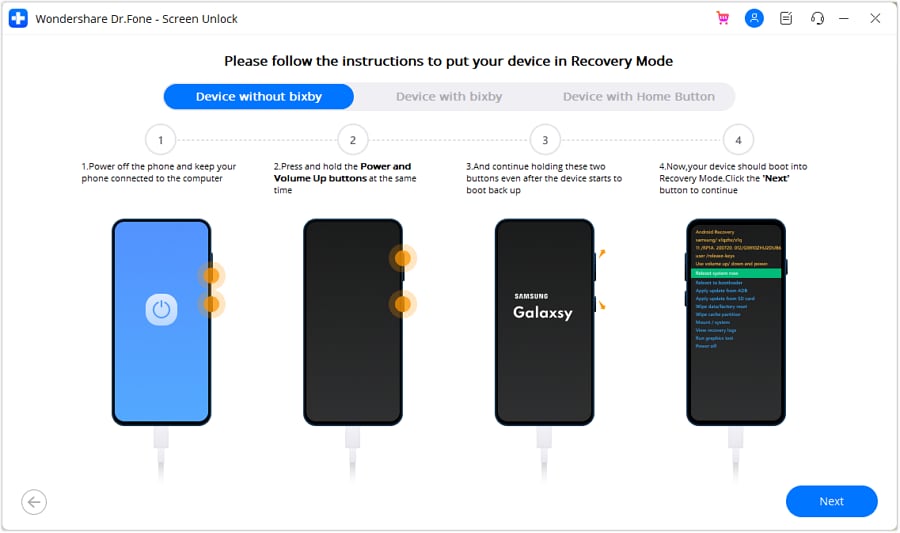
Get into Recovery Mode in Samsung phone with Home Button:
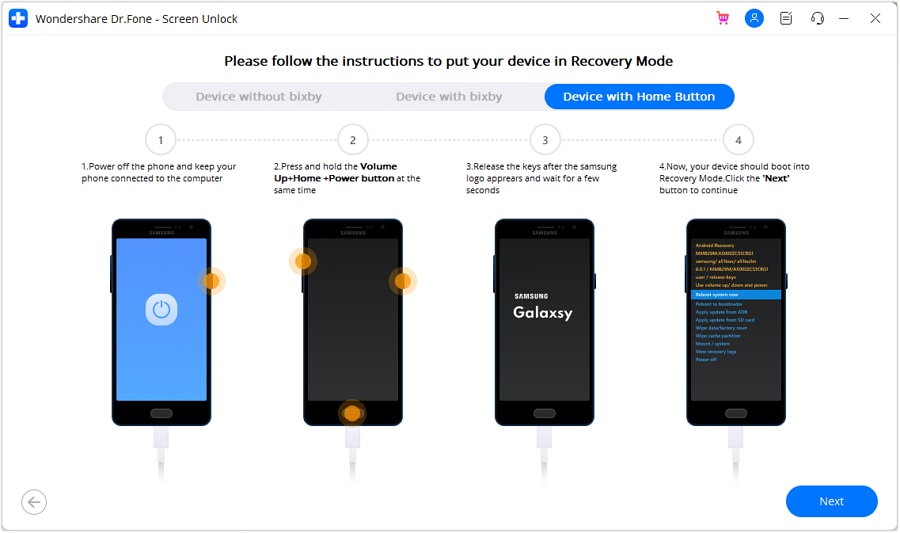
Step 5. Instructions to Wipe Cache Partition
During the steps in Recovery Mode, please don’t pick the wrong choices!
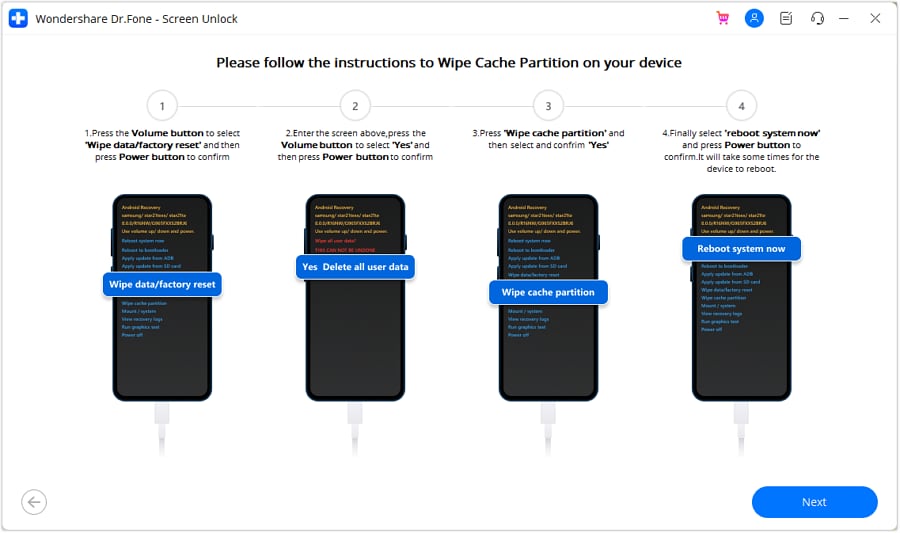
You’re now able to access your Android device again when the whole process is over. And you no longer need a password or pattern!
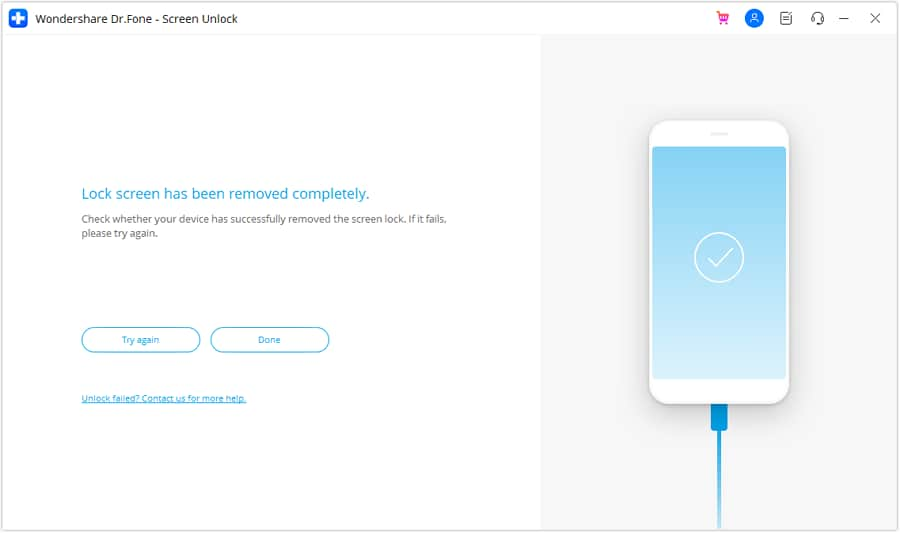
Part 3: Solutions to Unlock Android Screen
1. Google Find My Device
Step 1: Open the “Find my Device” webpage from a browser on your PC.

Step 2: Click “Erase my device,” which you will see on the left half of your screen. After affirming the Delete capability, your phone will boot into recovery and begin playing out a production line reset. It is difficult to stop or drop on your android gadget when you endorse this activity. Regardless of whether you shut down your Android phone - the reboot will continue on startup.
2. Recovery Mode
Depending on your phone, the steps for this process might vary a little. Most phones will allow you to reset by getting to the recovery mode. Follow the steps below to remove the Android screen lock:
Step 1: Turn on the Asus ROG Phone 7 device and enter the boot menu. If you want to know how to do so, you can do a speed search on the internet.
Step 2: Access the safe mode, use the volume keys to navigate, and press the Power key to click.
Step 3: Search for the Wipe Data option and select it.

After that, your Android will start the process, which can require a few minutes. However, this process will erase all your user data.
3. Use ADB
This method is very confusing, so follow the steps cautiously on your Android phone to remove the phone lock. With your phone connected to your PC, and the cmd open, type the accompanying commands altogether:
- adb shell
- disc/data/data.com.android.providers.settings/databases
- sqlite3 settings.db
- update system set value=0 where name=’lock_pattern_autoblock’;
- update system set value=0 where name=’lockscreen.lockedoutpermanently’;
- .quit
After you’ve finished this, reboot your Android phone. If this doesn’t reset your lock screen, proceed to the following stage.
With your Android phone connected and the cmd opens, enter:
- abd shell rm/data/system/gesture.key
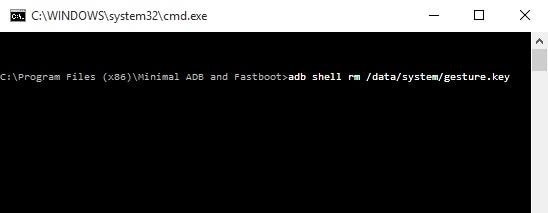
After entering, reboot your phone once more.
4. Boot into Safe Mode
Step 1: For most phones and your Android, you can do this by opening the power menu and holding the “Power Off.” A message will spring up on your screen, asking whether you might want to Reboot to Safe Mode. Press Ok.
Step 2: Clear data from your lock screen application, uninstall and reboot your phone to escape the Safe mode. When you do so, your Android screen lock will unlock.
5. Crash Lock Screen
This strategy to sidestep a locked screen is only a crisis workaround for the phones in this classification.
- Enter ten asterisks (*) through the dialer application.

- Copy and paste asterisks on the dialer until the “Paste” choice no longer appears.
- Get back to the lock screen and tap on the camera symbol.
- Go to the settings on your Android after pulling down the notifications bar. Now you will have the chance to enter the password, and you must continue the same thing here. Continue to paste until the Android lock screen crashes.
Conclusion
Passwords shield our phones from unapproved access, yet we get locked out unexpectedly on our phone lock. Failing to remember your PIN can be irritating. However, we can assist you in reaccessing your locked phone without a factory reset by using Dr.Fone - Screen Unlock. Dr.Fone is an expert in solving such problems in just a few minutes. So download this expert tool immediately for a quick solution.
How to Lock Apps on Asus ROG Phone 7 to Protect Your Individual Information
If you are not a fan of having to go through the process of getting through a pattern or password every time you want to use your phone, the good news is that you don’t have to. There are really just a few Apps on your Android device that have sensitive information you don’t want others getting access to. It would really be great if you could lock those apps individually as opposed to locking the Asus ROG Phone 7 device as a whole.
Well, in light of helping you out, this article will address just how you can lock Apps on your device and not have to type in a code every time you want to use the Asus ROG Phone 7 device.
Part 1. Why you need to Lock Apps on Android?
Before we get down to the business of locking some of your Apps, let’s look at some of the reasons why you would want to lock certain apps.
- You may simply want better access on your device. Locking certain apps will allow you to easily access the Asus ROG Phone 7 device and use it without having to remember passwords and patterns.
- If you are a person who is not good at remembering passwords or patterns, simply locking certain apps will help you not get locked out of your entire device which can cause a lot of problems.
- If your device is used by more than one person, locking certain apps will keep the other users out of information you would rather they didn’t access.
- If you have children, you can eliminate the many accidental in-app purchases by locking the apps your children shouldn’t be on.
- Locking apps is also a good way to keep children from content they shouldn’t be accessing.
Part 2. How to Lock Apps in Android
There is always a good reason to Lock Apps on your device and we have two easy and effective methods you can use to do this. Choose the one that you are most comfortable with.
Method One: Using Smart App Protector
Smart App Protector is a freeware that allows you to lock specified applications.
Step 1: Download and Install Smart App Protector from the Google Play Store and Launch it. You may be required to install a helper application for Smart App Protector. This helper will ensure that the many App services running on your device will not be killed by third party apps.
Step 2: The default password 7777 but you can change this in the Password & Pattern Settings.

Step 3: The next step is to add apps to the Smart App Protector. Open the Running Tab on Smart Protector and tap on the “Add” button.

Step 3: Next, select the apps you would like to protect from the pop up list. Tap on the “Add” button once you have chosen your Apps.
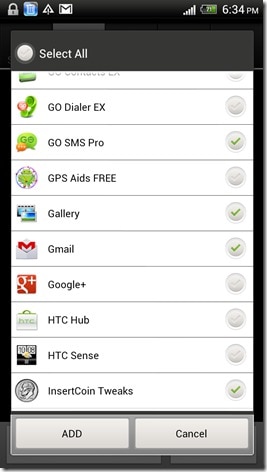
Step 4: Now close the app and the Apps chosen will now be password protected.

Method 2: Using Hexlock
Step 1: Download Hexlock from the Google Play Store. Once it is installed, open it. You will be required to enter a pattern or PIN. This is the lock code that you will use every time you open the app.
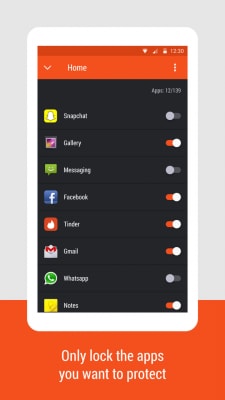
Step 2: Once the PIN or Password is set, you are now ready to lock apps. You can create multiple lists of Apps to be locked ba_x_sed on your different needs. As an example, we have chosen the Work panel. Tap on “Start Locking Apps” to start.
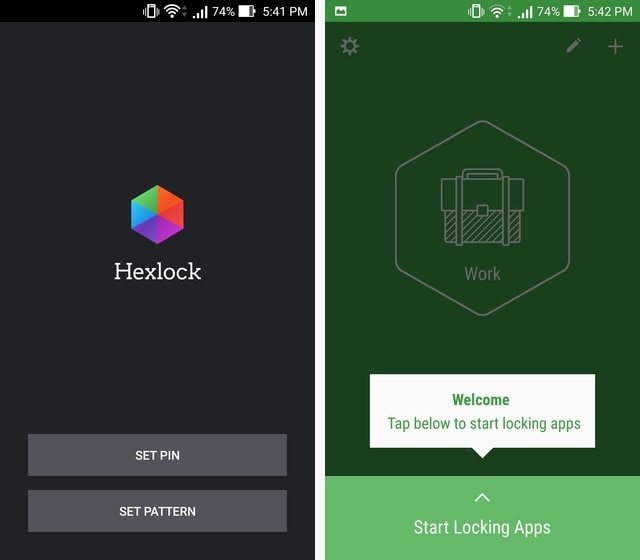
Step 3: You will see a list of Apps to choose from. Choose the Apps you wish to lock and then Tap the down arrow in the upper left when you are done.
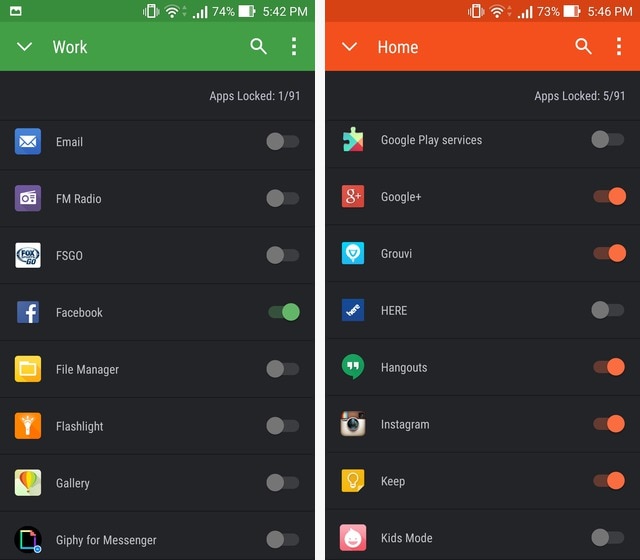
You can then Swipe to the left to move to other lists such as “Home” and proceed to lock apps in this group as well.
Part 3. 6 Private Apps that you should lock on your Android
There are certain apps that may require to be locked more than others. Of course the choice of which apps you should lock will depend on your own uses and preferences. The following are some of the apps you would like to lock for one reason or another.
1. The Messaging App
This is the application that allows you to send and receive messages. You may want to lock this app if you use your device to send messages of a sensitive nature that you would rather keep private. You may also want to lock this app if your device is used by more than one person and you don’t want other users reading your messages.

2. Email App
Most people use individual email applications such as Yahoo Mail App or Gmail. This is another critical one if you are going to protect your work emails. You may want to lock the email app if your work emails are sensitive in nature and contain information that is not for all individuals.

3. Google Play Services
This is the application that allows you to download and install applications to your device. You may want to lock this one if you are trying to prevent other users from downloading and installing further apps to your device. This is especially valuable if your device is utilized by children.
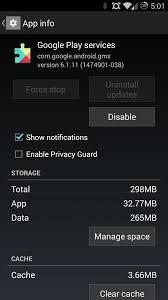
4. Gallery App
The Gallery app displays all the images on your device. The main reason you may want to lock the Gallery app may be because you have sensitive images that are not suitable for all viewers. Again this is ideal if children make use of your device and you have images that you would rather they didn’t see.

5. Music Pla_x_yer App
This is the Application that you use to play the music on your device. You may want to lock it if you don’t want anyone else making changes to your saved audio files and playlists or don’t want someone listening to your audio files.

6. File Manager App
This is the App that displays all of the files that are saved on your device. It is the ultimate app to lock if you have sensitive information on your device that you would rather not share. Locking this app will ensure that all of the files on your device will remain safe from prying eyes.
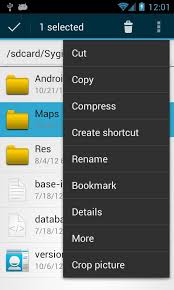
Having the ability to lock your Apps is an easy way to keep information out of the limelight. It also allows you to take full control of your device. Try it, it might just be freeing as opposed to locking your entire device.
Also read:
- [New] Facebook Video Acquisition Made Easy Best Android Downloader Apps Ranked for 2024
- [New] Say Goodbye to Vertical and Horizontal Bars in YouTube Movies for 2024
- [Updated] In 2024, Your Complete iPhone Podcast Download Manual
- 2024 Approved Sierra's Best Curated List of Exceptional Mac Video Tools
- Enhancing Minecraft Through Optimal RAM Assignment
- Fixed Cannot Insert Object Error in Excel 2010 | Step-by-Step Guide
- How to Lock Apps on Vivo V29e to Protect Your Individual Information
- How to Remove Forgotten PIN Of Your Vivo Y200
- In 2024, How To Remove Screen Lock PIN On Samsung Galaxy A05s Like A Pro 5 Easy Ways
- In 2024, How to Reset your Samsung Galaxy F04 Lock Screen Password
- In 2024, The Updated Method to Bypass Oppo A1x 5G FRP
- In 2024, Unlocking the Power of Smart Lock A Beginners Guide for Vivo V27 Users
- Unbiased AVS Video Editor Review Is It Right for You?
- Unraveling Five Misconceptions in Acquiring New Tongues
- Title: How to Show Wi-Fi Password on Asus ROG Phone 7
- Author: Peter
- Created at : 2025-01-14 23:36:42
- Updated at : 2025-01-17 00:11:42
- Link: https://android-unlock.techidaily.com/how-to-show-wi-fi-password-on-asus-rog-phone-7-by-drfone-android/
- License: This work is licensed under CC BY-NC-SA 4.0.